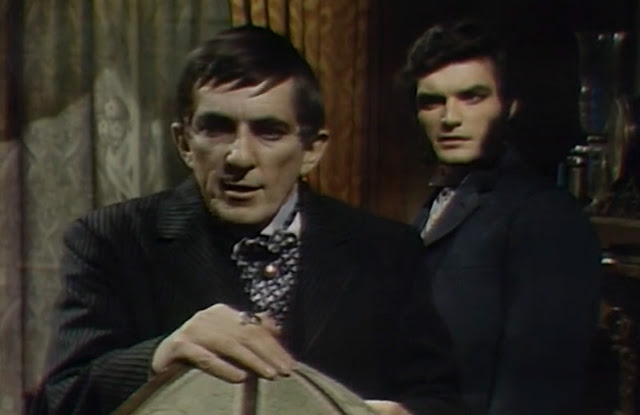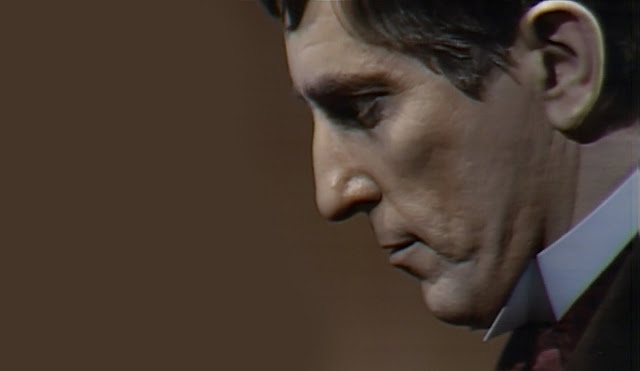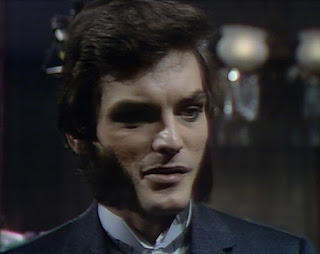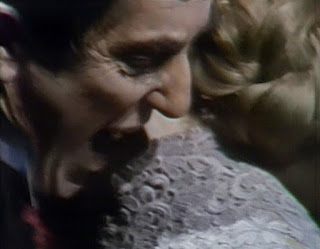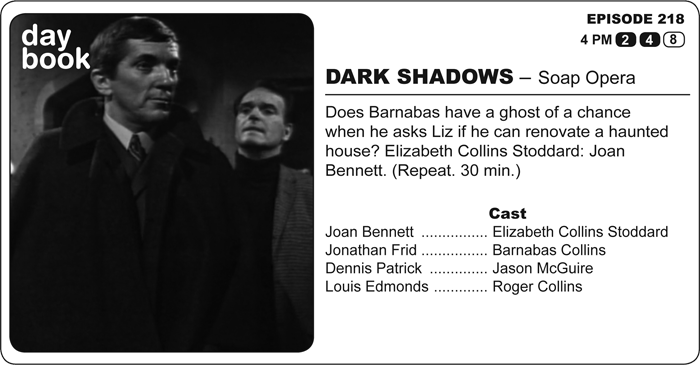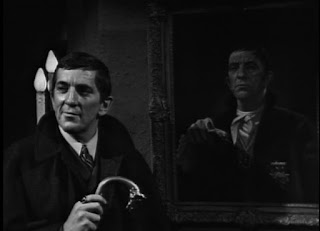By PATRICK McCRAY
Taped on this day in 1969: Episode 743
When Laura programs Jenny to become the ultimate assassin, will Barnabas and Quentin put their differences aside to combine forces? Barnabas: Jonathan Frid. (Repeat; 30 minutes.)
Barnabas tricks his way into obtaining Quentin‘s Book of the Dead. It’s a successful gambit, perfectly timed to reveal that Laura Collins is actually Laura Stockbridge Collins, a returning fire demon from his youth. Quentin must trust Barnabas when considering his mysterious cousin against the obviously more destructive forces around him.
It should have been a matter of one world ending and another world beginning. Simple, right? There was a point when it happened before. The show shifted focus… officially. A story about Victoria changed to one where Barnabas was no longer this really interesting side character. He was the character. Where? Perhaps right before 1795 or during. During is a good choice because it starts out as Vicki’s story, but she has to be forced into a witch trial just to give her something to do. No, it’s officially Barnabas’ story. It introduces Angelique as the catalyst for his change. If she got the story moving, it’s no wonder that the show should finally resolve itself when she resolves herself.
Batons pass hands in marathons… and sometimes they come back. Dark Shadows specializes in cycles that vary based on what’s happened in between. Even the structure of the show is a cyclical ritual. Recap. Title and theme. Narration. Resolve the recap. Add less information than it feels at the time. Unresolved crisis. Credits.
In between all of that is where lives change, and 743 is what could and should have been the fulcrum from Barnabas to Quentin because it contains the moment any self-respecting fan is waiting for from the moment they hear that heroes on Dark Shadows didn’t stop with Barnabas. There was this other guy, Quentin. And for a time, they are both the heroes of the show and yet are constantly pitted against each other. Terrified mistrust is the one beloved and shared virtue tying all Collinses together across the centuries. It’s no wonder that Barnabas doesn’t save time by simply being honest with Quentin. Honesty bruises the gin, and the writers are going to need it if they have to unite these guys.
Seeing them unite to deal with Laura is uniquely satisfying, and Jonathan Frid and David Selby maintain the tension with admirable gamesmanship. Bringing back Laura Collins was one of the show’s truest masterstrokes. She becomes a thread taking us from long before the appearance of Barnabas to a point even more distant in the past than his origin, and then into the fantastic future of 1897. I’m not sure what this does more of to critics of the program… prove its delightfully substantive complexity or give them ammo to cry, “Codswallop!” (By the way, that’s not asking for opinions. It’s a test with a right answer and a wrong one.)
Laura is kind of the linchpin of this. The thing that stops Quentin‘s story from becoming the dominant one for the rest of the series is that it pretty much resolves itself in 1897. It’s extremely satisfying, but it’s brief. The story of Barnabas runs through the entire series. However, it’s fun to look at how the cycle changes itself, however briefly, and if only to comment on the Barnabas story. Both stories involve men who cheat. Both stories involve women who are cheated on, Josette and Jenny, respectively. Both stories involve a magic user who inspires the cheating. But Quentin’s story is far more cynical. Even though the man in it is more of a cad at the beginning, he also has much more destructive women surrounding him. Chicken or ovum? Angelique legitimately loves Barnabas. I think it’s pretty clear that Laura has very little interest in Quentin except as an excuse to get her to Alexandria. Josette is a victim in all of this, but she is only used against Barnabas to induce guilt, anxiety, and two, at first, drive him to choosing Angelique. Laura, however, is an engine of pure destruction, which is, of course, the job of fire. Angelique is more of an elemental figure of nature, and thus, is more driven by natural urges in and around procreation and the emotional attachments associated with it. she uses Jossette, with a lot of cruelty, but it is to either get Barnabas or punish him for not attending that particular Sadie Hawkins dance. On the other hand, Laura positively weaponizes Jenny as an assassin, pure and simple.
I’m sure the program examines Laura‘s motives, but I’m not sure they really matter. Just as Quentin is a passion driven mirror for Barnabas, allowing us to appreciate the latter‘s contemplative nuance, Laura‘s destructive nature is the perfect foil for Angelique. Angelique‘s evolving heroism is perhaps the most truly interesting part of the 1897 storyline, and by seeing her in relief to Laura, it’s easy to begin viewing her as the more sympathetic figure. Quentin‘s storyline is ultimately less tragic in the Greek sense, but it somehow feels sadder. he is surrounded by no one who seems to really love him. Jenny is crazy, so whatever she feels is going to change in about five seconds, disqualifying it from serious consideration. And Laura is a nightmare who never really loved him. However, both Josette and Angelique genuinely love Barnabas, and this makes us continue to care about him as a vulnerable figure, because he is presented as intrinsically lovable. Why? He is ultimately a good man, and his seeming flaws, which are his conscience-based indecision and the rash action he takes to compensate, finally show themselves as virtues. No, they are not necessarily part of the masculine archetype, but that’s the point. Barnabas is an extremely feminine thinker in a world surrounded by women. Quentin shows what you get with an excess of masculine thinking. He is lust and he is action. You know, everything that a man is supposed to be. So unlike Barnabas. But it only makes Quentin a magnet for women to exercise their wrath for wrath’s sake. And it also manifested self in the nature of his curse: he is revealed as the savage, lone wolf who never finds a pack.
If the largely feminine audience always liked Barnabas, but could never quite identify why, the presence of Quentin defines it by implication. It’s the show saying, “OK, now here is a traditional man with the traditional psychological traits of a man. Yeah, he’s a lot of fun, but he also winds up sad and alone. look at Barnabas. Not really the traditional masculine figure at all. And he ends up being all the better for it.”
Television at this time was beginning to explore these redefined models of manhood in characters like Spock. but Spock’s decisions seem to originate somewhere between the cultural requirements of being a Vulcan and actual biological pre-determinism, also associated with being a Vulcan. Barnabas comes about it simply by thinking a little differently. In many ways, he exhibits the sort of masculine representation that we would see in someone like Hawkeye Pierce, so someone get him a martini.
Seeing Barnabas and Quentin working together on magical workings in this episode, we begin to enjoy the synergy possible when the two men combine to take power back from a strictly vengeful figure like Laura. Audiences, desiring both men, briefly had their beefcake and got it to bite their necks, too. This was on the mind of the zeitgeist, echoing the most psychologically insightful episode of Star Trek, “The Enemy Within.” With that, author Richard Matheson concluded that the balanced masculine psyche required both the Barnabas side and the Quentin side. Dark Shadows has a slower burn, and eventually, and subtly, champions the feminine thinker over the masculine one. I would imagine that this is certainly a more appealing conclusion for a largely feminine audience, many of whom were dreading the daily return of their mid century modern nightmares of husbands who would be coming home every day shortly after the show’s closing credits would roll. But it’s also excellent modeling for boys watching the show, and somewhere, deep in the minds of mothers, there had to be more than one who quietly valued that positive modeling.
You know, sort of. If you ignore countless moral feelings and the potential for supernatural violence. But those are aspects of Barnabas‘s personality that he doesn’t want. it’s telling that he should return to women again and again to eliminate those abilities.
Because they probably aren’t worth it. Not really.
This episode hit the airwaves on April 30, 1969.

